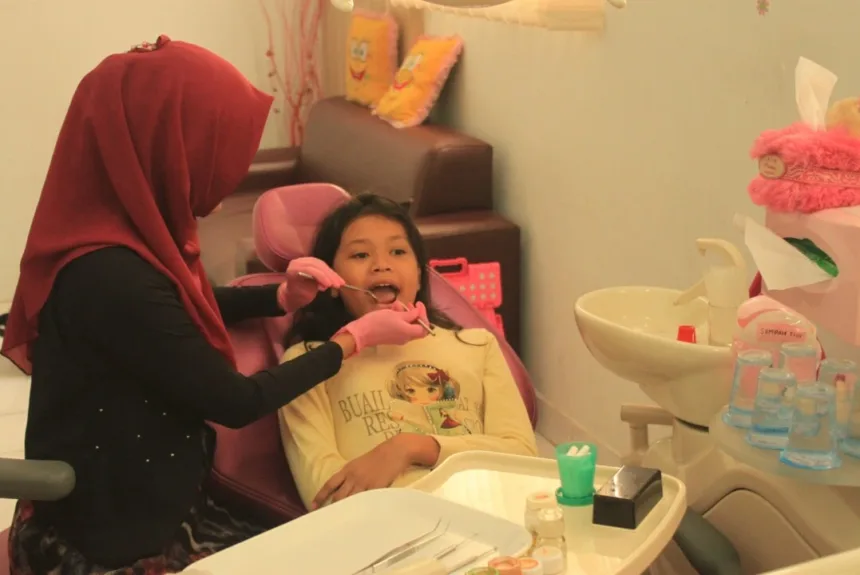The Risks of Milk Teeth Cavity: Top Smile Dental Clinic in Oud Metha Dubai
Introduction:
A child’s smile is precious, and maintaining their dental health plays a crucial role in preserving it. One common dental issue that affects children is cavities in milk teeth, also known as baby teeth or milk rot teeth. Neglecting these cavities can seriously harm a child’s oral health, even though these teeth eventually fall out. In this comprehensive blog, we’ll delve into the popular question “Does milk cause tooth decay?”. Along with that we’ll learn about the dangers associated with milk teeth cavity, often referred to as milk tooth decay or milk cavities. We’ll also explore whether milk itself can contribute to cavities and discuss the importance of addressing these concerns promptly. If you’re a parent in Oud Metha, Dubai, Top Smile Dental Clinic can help safeguard your child’s dental well-being.
Understanding Milk Teeth Cavity:
Cavities, also known as dental caries or tooth decay, can affect anyone, including children. Milk teeth, or primary teeth, are particularly vulnerable to cavities due to several reasons:
-
Thin Enamel:
Milk teeth have thinner enamel compared to adult teeth, making them more susceptible to decay-causing bacteria.
-
Extended Exposure:
Children often consume sugary foods and drinks, especially when paired with inadequate oral hygiene. This creates an ideal environment for milk tooth cavity-causing bacteria. Since milk teeth remain in the mouth for several years, they are exposed to these factors for an extended period.
-
Crucial for Development:
Milk teeth act as placeholders for permanent teeth. Premature loss due to cavities can result in alignment issues and affect speech development.
The Consequences of Neglecting Milk Teeth Cavity:
Neglecting cavities in milk teeth can lead to various complications:
-
Pain and Discomfort:
Cavities can cause pain and discomfort, impacting a child’s eating, sleeping, and daily activities. This discomfort can be especially distressing for young children.
-
Risk of Infection:
Untreated cavities can lead to infections in the tooth or surrounding tissues. This can result in more severe dental issues, possibly requiring extensive treatments like root canals.
-
Impact on Speech and Language Development:
Milk teeth play a significant role in the development of speech and language skills. Cavities affecting these teeth can hinder effective communication.
-
Aesthetic Concerns:
Discolored or damaged milk teeth can affect a child’s self-esteem and confidence. It’s essential to maintain a healthy smile during their formative years.
-
Permanent Tooth Problems:
Damage to milk teeth can affect the eruption and alignment of permanent teeth, potentially leading to orthodontic issues later in life.
Causes of Milk Teeth Cavity:
Understanding the causes of milk teeth cavity can help parents take preventive measures. Some common causes include:
-
Inadequate Oral Hygiene:
Insufficient brushing and flossing allow harmful bacteria to thrive in the mouth, leading to milk teeth decay.
-
High Sugar Diet:
Consuming sugary foods and beverages without proper oral care can lead to milk tooth cavity development. This raises questions such as, “Does milk cause tooth decay?” and “Can milk cause cavities?” We’ll address these concerns shortly.
-
Bottle Feeding:
Prolonged bottle feeding, especially with sugary liquids like juice or milk at bedtime, can result in “bottle rot,” a severe form of milk tooth decay.
-
Lack of Fluoride:
Fluoride is essential for strengthening tooth enamel. In areas with low fluoride in water, fluoride treatments may be necessary.
Does Milk cause tooth decay? Does Milk Cause Cavities?
Milk is often considered a healthy choice for children because of its calcium content, which is beneficial for building strong teeth and bones. However, it’s essential to use milk judiciously to prevent cavities. While milk itself doesn’t directly cause cavities, the naturally occurring sugars in milk can contribute to milk tooth decay if proper oral hygiene isn’t maintained.
It’s vital to note that other sugary foods and beverages, such as fruit juices and soda, pose a more significant risk to dental health due to their higher sugar content. Nevertheless, even milk can be a factor when consumed excessively or inappropriately, such as through prolonged bottle feeding.
Preventing Milk Teeth Cavity:
Prevention is always preferable to treatment. Here are some tips to help prevent cavities in your child’s milk teeth while also addressing milk-related concerns:
-
Effective Oral Hygiene:
Teach your child to brush their teeth twice a day using fluoride toothpaste and to floss regularly. Encourage gentle yet thorough brushing.
-
Balanced Diet:
Limit sugary snacks and beverages, including fruit juices. Promote a balanced diet rich in fruits, vegetables, and dairy products.
-
Regular Dental Check-ups:
Schedule regular dental check-ups for your child, starting from their first birthday or when their first tooth erupts.
-
Dental Sealants:
Consider dental sealants to protect the chewing surfaces of molars from milk tooth decay.
-
Fluoride Treatments:
Consult your dentist about fluoride treatments that can strengthen your child’s tooth enamel.
Treatment for Milk Teeth Cavity:
If cavities develop in your child’s milk teeth, it’s crucial to address them promptly. Common treatment options include:
-
Dental Fillings:
Small cavities can often be treated with dental fillings, which restore the tooth’s structure.
-
Pulpotomy:
In more severe cases, a pulpotomy may be necessary to remove infected pulp tissue while preserving the tooth.
-
Extraction:
In cases of extensive damage, the tooth may need to be extracted to prevent further infection.
-
Stainless Steel Crowns:
Crowns may be placed on extensively damaged teeth to protect them.
Conclusion:
Milk teeth cavity, often associated with terms like milk cavities, milk tooth cavity, milk caries, and milk mouth teeth, can have significant repercussions on your child’s oral health and overall well-being. Recognizing the dangers associated with untreated cavities is the first step in safeguarding your child’s smile. At Top Smile Dental Clinic in Oud Metha, Dubai, our experienced pediatric dentists are here to provide expert care for your little ones. Don’t wait until it’s too late; schedule a dental check-up today and give your child the gift of a healthy smile for life. Your child’s dental health is a lifelong investment, so start early for a lifetime of healthy smiles. And remember, preventing milk tooth decay is vital, so be vigilant about your child’s dental health to avoid issues like milk caries.
Experience expert care for your child’s dental health, addressing milk teeth cavities – visit Top Smile Dental Clinic today and give them the gift of a lifetime of healthy smiles.
Frequently Asked Questions FAQ
Common signs of milk teeth cavity in children may include:
- Tooth sensitivity or pain, especially when consuming hot, cold, sweet, or acidic foods and beverages.
- Visible white, brown, or black spots or discoloration on the teeth.
- Complaints of discomfort or pain while chewing.
- Unpleasant breath odor.
- Swelling or redness around the gums.
If you notice any of these signs, it’s important to schedule a dental check-up for your child to address the issue promptly.
Milk is generally considered a healthy choice for children due to its calcium content, which supports strong teeth and bones. However, it’s essential to maintain good oral hygiene practices alongside milk consumption. While milk itself doesn’t directly cause cavities, the natural sugars in milk can contribute to milk teeth cavity if proper oral care is neglected.
It’s important to note that other sugary foods and beverages pose a greater risk to dental health due to their higher sugar content. Nevertheless, even milk can be a factor if consumed excessively or inappropriately, such as through prolonged bottle feeding. To protect your child’s dental health, encourage a balanced diet and regular oral hygiene.
A child should have their first dental check-up as early as their first birthday or when their first tooth erupts. Early dental visits help establish good oral care habits and allow the dentist to monitor your child’s dental development.
During the first visit, the dentist will typically perform a gentle examination of your child’s mouth, gums, and any emerging teeth. They will also discuss oral hygiene practices, proper nutrition, and provide guidance on teething. These early visits are essential for preventing dental issues and ensuring your child’s oral health is on the right track.


